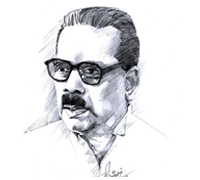Book Details
BACK|
Title |
Ancient Tamil Poetry and Poetics: New Perspectives |
|
Author |
P. Marudanayagam |
|
Publisher |
Chennai: Central Institute of Classical Tamil |
|
Publish Year |
2010 |
|
Language |
English |
|
Book ISBN |
978-81-90800-01-3 (HB) |
|
Number of Pages |
297 |
|
Book Price |
Rs.450.00 |
|
About the Book:- |
The twenty-one essays in the volume entitled Ancient Tamil Poetry and Poetics: New Perspectives examine ancient Tamil poetry and poetics from diverse contemporary perspectives and attempt to substantiate the view that the claim of classics like Tolkàppiyam, Eññuttokai, Pattupàññu, Tirukkuaë, Cilappatikàm and Maõimkalai to international recognition and eternal fame is based on solid grounds. Extending the field of investigation with frame works that are global and subjecting the ancient Tamil texts to a close scrutiny, these articles seek to convince the non-Tamil readers that Tamil deserves the classical status that has equated it with Greek and Latin which have been cherished by the West as classical languages for a long time. The concept of poetry as expounded in Tolkàppiyar’s “Poruëatikàram“ would, on close analysis, justify the claim that the Tamils, long before Coleridge, could conceive of a poem as an organic whole. The greatness of Tamil aesthetics is now increasingly recognized by the Western scholars who feel that it is subtle, complex and extremely valuable and may even serve as an effective antidote to modernism and post-modernism which have proved to be more an affliction than a healthy development in the realm of art. Puanàåru in its four hundred stanzas of varied lengths, dealing with several aspects of life on earth such as war, fame and poverty, served as a source from which succeeding generations of poets got numerous literary forms, themes, motifs, not to speak of similes, metaphors, images and symbols. Kailasapathy’s conclusion identifying puam poems as a product of the heroic age of Tamil has been rightly rejected by contemporary Tamil scholarship in asmuchas they are not oral in the same way that the Homeric epics and the songs of the Yugoslav bards are but are too complex to be extemporized. As New Historicism, bringing the two disciplines, literature and history, closer to each other than ever before, is interested in the parallel reading of literary and non-literary texts, it may be used to advantage in the reading of Caïkam texts which are full of historical references. The author of the first poem of kuuntokai would have meant it only as an akam poem or as a puam poem but the learned commentators have demonstrated that it provides scope for multiple contradicting interpretations and their stance is borne out by the present-day deconstructive criticism. In literary art, the imagination functions to reveal the essential truths of the human condition, whereas in pornography, fantasy functions primarily to arouse and to satisfy man’s sexual appetites. A close study of Tamil akam poetry will reveal that Tamil akam poetry passes this test and eminently qualifies for literary art. The kind of genre criticism advocated by the Chicago School of critics throws a flood of light on Mullaippàññu, the genre of which has been a bone of contention since the days of Naccinàrkkiiyar. A critical survey of the account of the eight types of marriage given in The Laws of Manu and Kamasutra clearly indicates that the Tamils’ Kaëavumaõam as described in Kui¤cippàññu radically differs from the so-called Gandharva marriage of the Aryans. George Hart’s findings about Kalidasa’s indebtedness to Caïkam poetry are confirmed by further research on the subject which reveals that several “Kavisamayas” and Tamil poetic conventions have gone into Maharastri Prakrit and Classical Sanskrit. Plato, Aristotle, and Vaëëuvar are found to be kindred spirits with regard to many of their views on the meaning and end of life but when it comes to cosmopolitanism and internationalism, the Tamil poet scores heavily over the Greek philosophers. The uniqueness of Cilappatikàram which, in its structure, theme and narrative and stylistic features, differs from the epics in Sanskrit and Western languages, becomes evident when it is compared with the well-known epics that have already found a place among world literature. The propagation of Buddhism is the chief motive of Maõimkalai, from which the three Cantos on religious doctrines may be cut out without causing any damage to the artistic integrity of the work. It is religious literature only in the third sense in which T.S. Eliot uses the term, i.e., the work of a man who sincerely wants to forward the cause of a religion. The book provides, for the first time, a comprehensive guide to the landmarks of Tamil literature through comparative perspectives and reveals the grandeur of a vast, rich and rarely studied literary tradition. |













